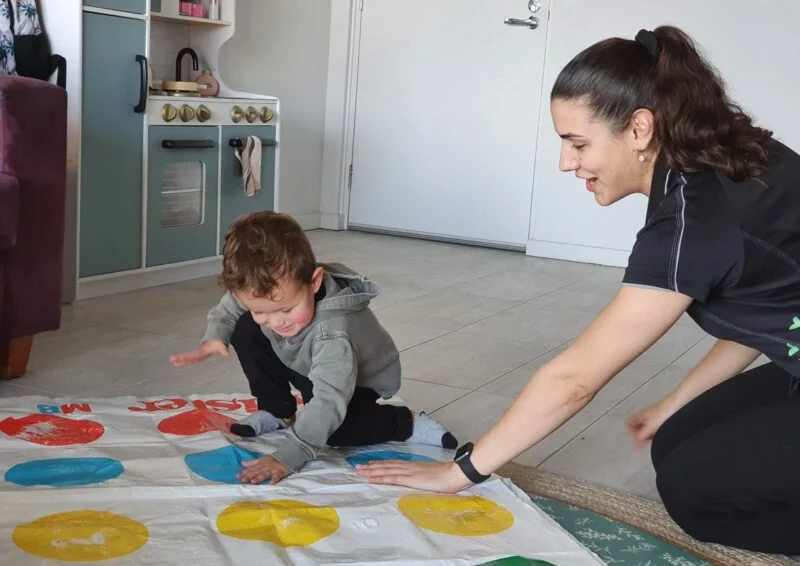Did you know that toddlers and children with vision loss are more likely to have delayed language skills?
Babies born with vision impairment, like VisAbility client Mateo, have trouble taking in their environment. As a result, they lack visual references and verbal interaction. Studies show they have a far more limited awareness of words and their meanings compared to their fully sighted peers.

A baby or toddler with vision impairment requires more input, such as a combination of touch and sound, to learn about their environment. They find it difficult to recognise specific facial features and expressions to understand the world around them. We often underestimate the recognise facial expressions to understand the world around them. We often underestimate the ways we communicate. It’s not just language – it’s also gestures, eye contact and much more.

The parents of two-and-a-half-year-old Mateo have noticed a big improvement in his language skills through weekly speech pathology sessions in his own home with VisAbility Speech Therapist Helena.
Mateo was born with septo-optic dysplasia (link opens in new window) – a rare condition affecting around 1 in every 10,000 births. In children with septo-optic dysplasia, the optic nerves are abnormally small, resulting in vision problems in one or both eyes.
Speech and language skill support for toddlers with vision loss
Every toddler or child needs to understand a word before they communicate it. Helena has been working with Mateo to encourage greater language use. Her techniques include:
- Pointing to everyday objects and encouraging repetition.
- Promoting child-led play, asking them what they want to do.
- Modelling. It’s an approach where a child learns through demonstration. For example, when a child is reaching for a ball, talk about the child picking up the ball.
- Book sharing. Discussing the storyline and talking about the pictures.
- Introducing words such as ‘first,’ ‘then,’ and ‘finally,’ so the child knows what happens next.
- Incorporating a higher level of facial expressions and using body language and gestures to explain things.
Play dough – initiating action words
How does Helena work with Mateo? We’ve been shadowing a speech pathology session to find out. A lot of the principles are based on the Hanen Strategy (link opens in new window) and the ‘It Takes Two to Talk program’.
Mateo is familiar with Helena, so looks forward to her weekly visits. He always greets her with a smile. Helena brings toys, books and games to encourage language development.
During a recent therapy session, Mateo asked Helena if she could get out the play dough.

“Mateo loves the play dough. It’s a great opportunity to incorporate action words like rolling, squeezing and pushing. I can talk about the cutters and shapes. Plus, we talk about the different colours.”
Helena explains how she encourages the repetition of words in her interaction with Mateo.
“For example, Mateo chose a star as a cutter. It was a great way to introduce a song ‘Twinkle, Twinkle Little Star’.”
Helena – VisAbility Speech Pathologist
Reading – observing and discussing objects
Next, Mateo chooses a book to read from a selection provided by Helena.
“I choose books with lots of visual elements to encourage active engagement. This book features different animals, so we speak about what types are in the book and what noise they make,” explains Helena.

“Mateo loves his books. He loves to read them several times over. The repetition is great because he starts to memorise them,” adds Elena, his mother.
Repetition with Twister
The game Twister has been around for years, but Helena introduces an adaption or twist to the Twister game.

Instead of a spinner that determines where the player has to put their hand or foot, Helena issues instructions with the words Simon Says.
“I might say Mateo put your right hand on the green circle or your left foot on the yellow circle. He follows the instructions. We then repeat them and talk about what we’re doing. It’s also a great way to learn about body parts and colours.”
Encouraging language at home
Mateo has been receiving speech pathology support since he was a baby. Sometimes Helena works alongside VisAbility Physiotherapist Kayla in joint sessions.
Kayla aims to improve Mateo’s balance and to work on his gross and fine motor skills through basic tasks, such as reaching and marching. Helena will issue instructions giving verbal prompts such as ‘reach the ball.’
Elena says the sessions have helped her to better understand techniques for her to try at home. She talks to Mateo as much as possible, always makes a point of describing what they’re doing together and encourages the repetition of words.
“I want to encourage dialogue with my son, so we talk a lot. If he needs help with anything, I’ll say ‘use your words’. Mateo will often say ‘help please!’ Just two words to indicate he needs my input.”
Elena – Mateo’s mother
How to get support
Please complete the form below to make an initial enquiry about the low vision services and support we can provide. Our Client Experience Team will contact you to discuss your individual needs both now and into the future.
There are a number of low vision support groups within Perth and across the state.
If you are a provider and wish to refer a client, please use our low vision medical certificate (online referral form) to make your referral.
